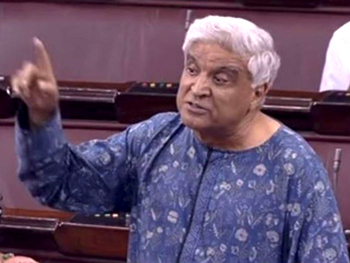New Delhi, Mar 16: Retiring as Rajya Sabha member, noted film personality Javed Akhtar said on Tuesday that "adjournaments" and "polarisation" will not take the country forward. He pleaded with the Opposition and the government to work together without thinking about the next elections. Taking a break from the usual uproar, the different political parties in the Upper House, were seen cheering Akhtar, unanimously.

government who can do good work but those making extremist comments, need to be reined in.
"I hope both Opposition and the government will work together. Adjournments will not take us forward. Even
polarisation will not take us forward. Please forget next election and think about the country," he said in his
impassioned speech. The house listened to him in rapt silence and occasionally burst into applause after a particularly good statement.
The film lyricist slyly slammed AIMIM leader and MP Asaddudin Owaisi for saying that he won’t chant 'Bharat mata ki jai' because the Constitution does not ask him to do so.
Taking a dig at Owaisi's constitutional rights, Akhtar said, "the Constitution even does not ask him to wear sherwani (dress) and topi (cap)... I don't care to know whether saying 'Bharat mata ki jai' is my duty or not but it is my right."
He went on to chant 'Bharat mata ki jai' a number of times.
He also condemned the right-wing extremists who say Muslims should go to Pakistan.
Underlining that there cannot be democracy without secularism, Akhtar said protecting secularism is not about
protecting one community or the other. "We need to protect secularism because there cannot be democracy without it. I believe this is our greatest achievement."
On religious freedom, Akhtar said time does not stop and the country either would move forward or backward.
"One who learns from experience is intelligent. But those who learn from others' experiences are more intelligent. Look at those countries where religion is given importance, where the tongue is cut and people are hanged if they speak against the religion. Whether that country should be an example for us or a country where there is religious freedom. We have to think," he asked.
Expressing concern over lack of development in the country, Akhtar said India has industrialised and become a big
power now but "more could have been achieved. Anyway whatever has been achieved is no less."
At the same time, he said, "We need to think why there is no development despite there being government and system in place? We want development but whose development and for whom? we need to think."
He added, "Development is not GDP. Development is Human Development Index. Be it any party, they wish the development of the countyr. Why our energies are wasted?"
On democracy, he said, "We are fortunate to have democracy though we complain about the government and society.
We don't thank what we have with us. We don't thank enough to our constitution. ...The constitution gives democracry. But remember, there cannot be democracry without secularism."
He said that the meaning of democracy is taking views of the majority and not minority. "But the democracy believes
that majority and minority is not permanent. They keep changing. The democracy will die the day we define minority
and majority in our own way."
Emphasising the need to protect secularism, Akhtar said protecting secularism is not about protecting one community or the other. "We need to protect secularism because there cannot be democracy without it. I believe this is our greatest achievement."
Besides democracy and the Constitution, Akhtar said India has youth power unlike Japan and China.
"The country's 50 per cent of the population is young. 35 crore people are youth and in age group of 10-15 years.
They have lot of energy and talent," adding, "Japan has lost this advantage and China is losing this advantage. You have 20 years to take advantage of the youth power. Both Opposition and the government have to think about it," he said.





Comments
I dont think Javed saab knows anything about Islam. If he has little knowledge also, he would not have commented such nonsense. People like Kabir khan, SRK, Javed Akther, there are some more who are bothered about their status in bollywood. They even forgot that they have to Die & meet their manufacturer. Fools like him will make comment without any knowledge of the Religion. Javed Saab please dont comment if you are not 100% sure what are u saying
MUslim will not say this words bcz we believe whole world is created by allah .at the time of death we need shahada kalima if we say bharat mata ki we will not be able to say shahada may allah guide us ameen
Add new comment